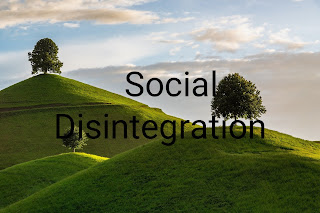 |
| Social disintegration |
Social disintegration is the exact opposite of social organization. Social disintegration occurs when social organization in a society is reduced or eliminated. Co-operation, co-operation and harmony work in an organized society and the members of the society are bound together by traditions, culture etc.
But when this form of society changes and anarchy, opposition, non-cooperation, etc. increase, then social disintegration begins. In a social organization there is complete adaptation in all the parts of the society but when this adaptation changes then the balance between the different sections of the society is disturbed. When this imbalance intensifies, social disintegration begins.
Social Disintegration Definition
Different sociologists have given social disintegration definition of in their own way which are described as follows: -
According to Agburn and Nimkoff, social disintegration means the disruption of the functioning of a social entity, such as a group, organization, or community.
According to Ferris, when relationships break down to the point where things stop happening, whatever the situation is, it's social disintegration.
According to Elliott and Merrill, social disintegration is the process by which social relationships between members of a group are broken or destroyed.
According to Thomas and Janenky, the effect of current disintegration of social norms on the behavior of members of a social disintegration group is diminishing.
According to Landis, social disintegration is primarily a breach of social control that leads to confusion and confusion.
According to Fairchild, social disintegration means the destruction of organized relationships and systems of work. Disruption of integration and organized behavior leads to disarray and misunderstanding.
Thus from these definitions it is clear that the state of social disintegration is a state in which the relations between the different members or organs of the society are broken which leads to imbalance in them. A state of anarchy, etc. arises in the society.
Characteristics of social disintegration
Features of Social Disintegration: -
1. In case of social disintegration, a state of unrest arises in the society which spreads anarchy in the society.
2. In a state of social disintegration, mutual trust among the people either decreases or disappears and superstition increases.
3. When a state of social disintegration occurs, the pure thoughts in the society disappear and are replaced by dirty and wrong thoughts.
4. In a state of social disintegration, hypocrisy etc. increase. Reality goes too far.
5. In this situation the population faces a lot of problems.
6. Social disintegration is never caused by the efforts of individuals but happens unconsciously. The member of the community does not even know it and it happens automatically.
7. It is not necessary that in the event of social disintegration, social institutions and rules etc. are completely abolished. It can never end. That is why complete social disintegration never occurs.
8. When it comes to social disintegration, there is a strong emphasis on individual freedom and rights.
9. In this situation the feeling of lust increases and people do their work for the sake of getting things of pleasure.
10. In social disintegration, social attitudes and values begin to erode and a state of anarchy ensues.
11. In the process, social institutions, practices, manure, etc. become ineffective.
12. Social change is very important in the process of social disintegration because disintegration is the result of the change that has taken place in society.
Symptoms or Levels of Social Disintegration
In the event of a social disintegration, some of the symptoms emerge that let us know that the society is disintegrating. The description of these symptoms is as follows:
1. Internationalist notions - In the event of social disintegration, the individual does not have the flow of the rules and practices of the society. When a person begins to look at things from his personal point of view, regardless of disintegration of social norms, practices etc., then his personality is not social but personal. At that point the group loses control of it and the process of social disintegration begins.
2. Change in the social structure - Social disintegration brings about a change in the status and functions of the members of the society. The tasks of each individual in an organized society are large and they work according to the same division. But sometimes it also happens that the status of the members of the society is not fixed and they work independently due to their work and behavior. This is when the social disintegration begins.
3. Struggle between manure and institutions - Every society is based on its manure and institutions so that the life of the members of the society runs in an organized manner. But over time, that is likely to change. Being outdated, it cannot meet the needs of members of the community. This is where the process of change in society begins. The struggle between ideas and ideals begins and new institutions and rules emerge. This is how the revolution of ideas comes about. Some people don't like to get rid of old institutions and manure and some want to get rid of them completely. There are some people who want to take the middle ground. Thus begins the struggle between old manure and new rules and old and new institutions. This spreads chaos in the society and starts the process of social disintegration.
4. Transferring or changing group tasks - When a group's tasks begin to be transferred, it is divided into several other groups. Sometimes the reasons for the transfer are not known and it is not even known to whom the transfer takes place. This causes chaos in the society and social disintegration starts. For example, we can see the transfer of the old family to the new family.
Our Indian society also has many signs of social disintegration. Social structures are changing. Stability and certainty are increasing in one's actions and situation. Individualism is on the rise.



0 Comments